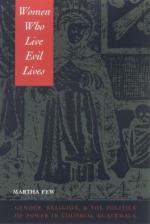|
This section contains 7,305 words (approx. 25 pages at 300 words per page) |

|
Any consideration of the historical development of gender and religion as a field of enquiry over the late twentieth century and the early twenty-first century must acknowledge the central role of feminism. From the beginning of the feminist movement a strong connection was made between the status of women and the authorizing function of religion (specifically Christianity) in maintaining gender inequalities. At the same time, however, attention was paid to its emancipatory potential. For example, campaigns for the abolition of slavery and extension of political rights to women were motivated by Christian ethical teachings. Furthermore moves to improve the status of women within ecclesiastical hierarchies were made: in 1853 the Congregational Church in New York ordained the first female minister, the Reverend Antoinette Brown (1825–1921), and in the early 1840s Oberlin College in the United States enrolled a small number of women into its theological school...
|
This section contains 7,305 words (approx. 25 pages at 300 words per page) |

|




